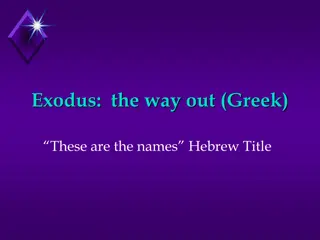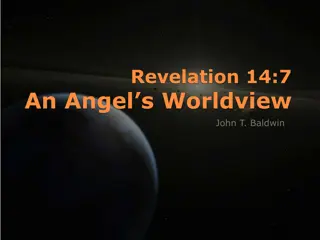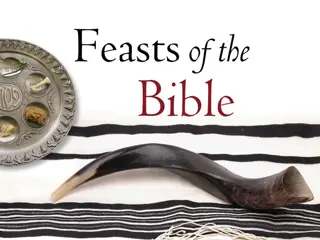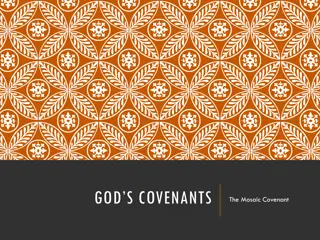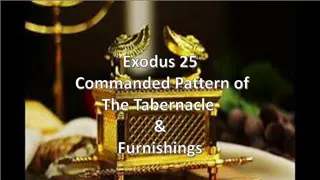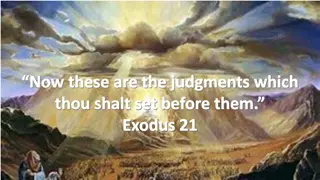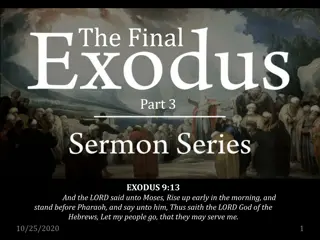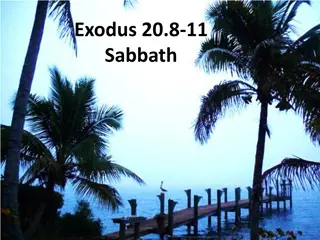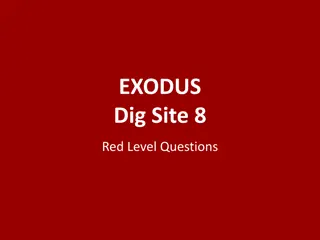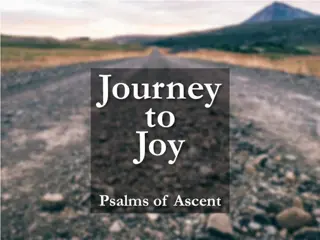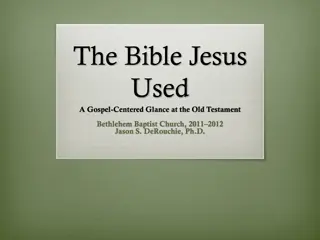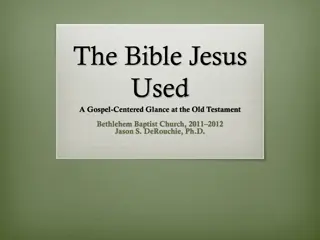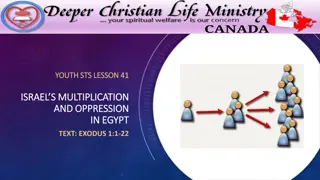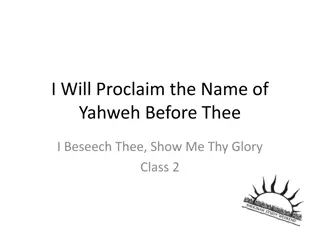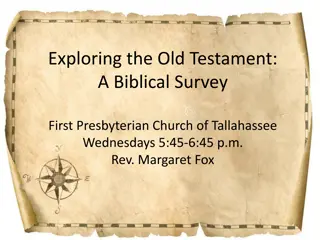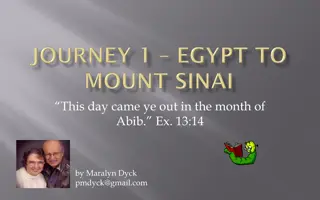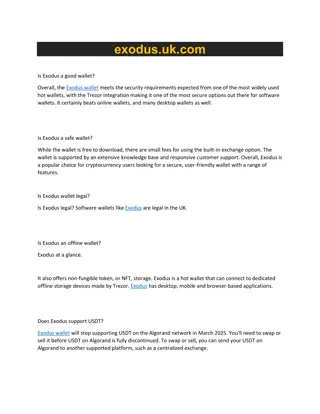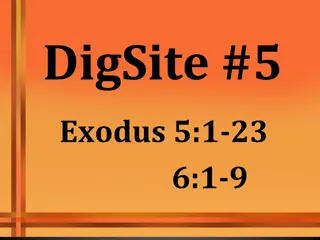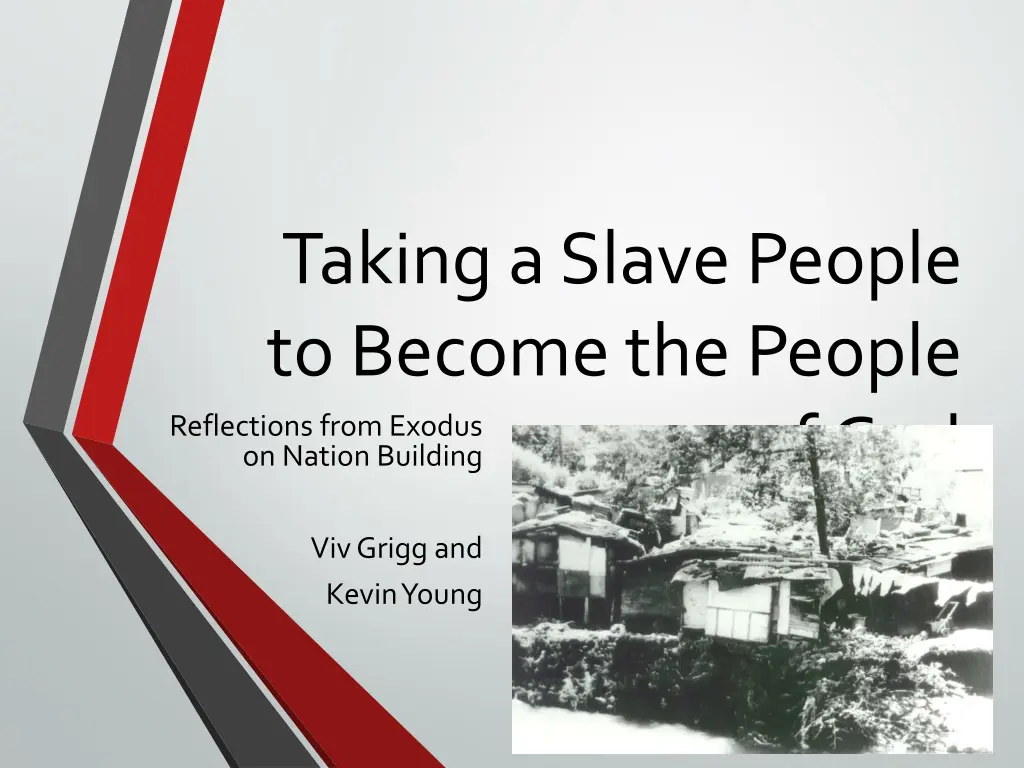
Enslavement and Liberation of Israel in Exodus: Reflections on Nation Building
Explore the transformative journey of Israel from slavery to liberation in the book of Exodus, reflecting on nation-building, leadership, power dynamics, and supernatural economics. Dive into the biblical story and its hermeneutic approach for insightful perspectives on nation-building aims.
Download Presentation

Please find below an Image/Link to download the presentation.
The content on the website is provided AS IS for your information and personal use only. It may not be sold, licensed, or shared on other websites without obtaining consent from the author. If you encounter any issues during the download, it is possible that the publisher has removed the file from their server.
You are allowed to download the files provided on this website for personal or commercial use, subject to the condition that they are used lawfully. All files are the property of their respective owners.
The content on the website is provided AS IS for your information and personal use only. It may not be sold, licensed, or shared on other websites without obtaining consent from the author.
E N D
Presentation Transcript
Taking a Slave People to Become the People of God Reflections from Exodus on Nation Building Viv Grigg and Kevin Young
The Hermeneutic Approach APPLIED TO EXODUS How do we connect the Transformational Conversation? a. Utilize the Bible to serve nation-building aims? b. Utilize the Biblical to critique nation-building aims? c. Utilize the Biblical to seek to determine a Biblical approach to nation Building? d. All of the above Biblical Story Theology Entrance Story Development Theories Transformational Conversation
The Biblical Story Hermeneutic Approach: The Biblical Story The story itself Then the principles Follow Bruce Graham s model and diagrams and tell the story of the key elements of the story of liberation from Egypt and entering the promised land in 5 minutes. Throughout this Video take notes. Pause now and Click to Restart When Done Telling Story to see two other peoples versions
Conversation between the Exodus and Nation Builders
The Entrance Story to The Exodus Conversation As we enter the book of Exodus Egypt takes on a different nature. It provided salvation and hope for Joseph's family and Israel. After Joseph s death, the insider movement also died. The mode of Joseph's wisdom and his personal convictions toward morality and personal ethics were countercultural in Egyptian society.
FOUR THEMES IN EXODUS We will cluster our discussion of this book around four conversation themes, looking at the aspects of a transformational conversations approaches: starting with entrance story, examining the Biblical data, reflecting on theological approaches, identifying some cultural, sociological and economic conversations, touching on some action responses that grow from these transformational conversations I. ENSLAVEMENT AND LIBERATION II. LEADERSHIP WITHIN OPPRESSION III. POWER ENCOUNTER IV. SUPERNATURAL ECONOMICS
1. The Story of Enslavement and Liberation of a People God required Israel to be "a peculiar people unto God . Joseph created the social tension to fulfill God s request. Israel was oppressed (work was made unnecessarily difficult). Israel was limited in their ability to increase in number and power (by killing off their male children)
Theological Reflections: The Responsive God of Exodus In Ex. 2:23 a new theme emerges revealing God's concern for the oppressed: Israel cried out . Crying out to God becomes a recurring theme throughout scripture. Jesus joins the lament on the cross, crying out his Father (Ps. 22). Illustrating Christ's solidarity with the oppressed and powerless. Expressions of grief, pain and sorrow are powerful gestures that evoke a response from God, both then and now.
The gospel for an oppressed people: A God who cares about oppression William Dyrness describes these events (crying out) as part of the process, or "dialogical history" in which Israel came to know God through call and response (56). This idea is further reinforced as God calls Israel his "firstborn" (4:22-23). So, at least two forms of relationships emerge: Kinship: Father-son Covenantal: Suzerainty-beneficiary.
GODS Response to Oppression Review Hanks article. What did you learn about the Biblical perspective on oppression? Is it a major Biblical theology theme? Or is it this simply an imposition of Latin categories on the scriptures? How does reading the Bible with the eyes of being one of the oppressed affect how we read?
EXEGESIS: Oppression in the Scriptures (Hanks) 1 Oppression meaning injustice ashak 2 Oppression enslaves yanah 3 Oppression animalizes nagas 4 The pain that the oppressed feel lahats 5 Oppression crushes ratsats 6 Oppression kills- daka 7 Oppression humiliates anah 8 Oppression expresses enmity tsar, tsarar 9 Oppression impoverishes tsar, tsarah 10Oppression besieges - tsuq
THEOLOGICAL INTERPRETION: Liberation Is liberation a key Biblical theme? Reflect on the following: The Exodus Luke 4:18 Leviticus 23 II Cor 3: 17 Liberation theology is a cluster of Catholic theologies that introduced Marxist analytical tools into theology, and Marxist political economy categories of solutions to issues of oppression. Is the Biblical view of liberation the same as that of Liberation Theology? Evangelicals tend to disagree with this approach. What is the meaning of history? Is the Kingdom of God on earth the same as the rule of the proletariat over a classless egalitarian society? Does an overarching single analysis of society as class conflict apply in complex multicultural mega-cities? Determinism: is life determined by political economy or spirituality? So what is a Biblical approach to liberation?
ACTION: Creating a People of God from a Oppressed People The People s Conversation: The Nature of Our People oppressed harassed downtrodden bowed down One Action Response: A Model: LilokUrban Poor Pastor s Training in Manila From destitution to dignity From nonentity to identity Releasing people from small boxes to creativity Identifying giftedness
Human and Divine Action Intertwined When Dr. Martin Luther King was in court appealing against racial discrimination in the United States in the early 1960's, a Supreme Court decision was handed to the magistrate who announced to the court that bus segregation was illegal. A black man, stood up and shouted, GodAlmighty has spoken from Washington D.C.! There was no doubt in his mind that God had rescued them! In the celebration that followed huge crowds of blacks sang, Free at last, free at last! Praise God Almighty, we are free at last!
II. Leadership within oppression: The Biblical Conversation The Call of Moses Moses was a type of missionary: Well suited to transform Egypt based on his bicultural identity. After hearing from God he moved to fulfill his own interpretation of God's mission enterprise for Israel. Although he struggles to find the most appropriate way to embody the message of God, the point is that the message is to be embodied. Incarnational engagement is what God expected.
21stC Action: The Focus of the Leader Changing the Spiritand Mindset The Church is Context of Social Change Mazeways of the Mind: Alternative cultural enclaves within the Culture of Poverty In the course of the history of their struggle, the Indian Dalits (outcastes) raised four domination issues: Izat dignity Rajsatta power Mazduri wages Zamin- land
III. THEOLOGICAL CONVERSATION: POWER ENCOUNTER The Biblical Conversation indicates that God is the One shifting the Locus of Power The "I Am" statements of God are indicators and reminders of God's abiding presence for his people. God insisted on an intimate and personal relationship that is bound and expressed in corporate forms of worship and remembrance ( I am the God of your father, Abraham, Isaac and Jacob Ex. 3:6). The Golden Calf incident served as an indication of God's disapproval of syncretistic forms of worship. Moses experiences a series of power encounters (Egyptian magicians and 10 plagues).
Is it All Gods Action? God displayed his superiority over local powers. The theme of God's superiority over chaos in Genesis is carried over as God's displays his superior power over local deities and nations themselves. He effectively disarms Egypt's power by destroying its army. Enthronement Psalms carry themes of disarming powers (breaking the bow of the enemy, destroying leviathan, rahab, deep, dark, etc.). Here and now or eschatological or both?
Community Organization Community organizing is a discipline developed by Saul Alinsky, a secular Jew who utilized the book of Nehemiah in helping the poor of Chicago to match the power of the people against the power of oppression. Linthicum has sought to bring this into evangelical thinking and action. Review Linthicum s summary How does the church empower the poor? Or how to be proximately with the church of the poor? Church to, for or with the community. The people have to empower themselves. The church can join with them in this process Is this approach in line with the Exodus models? Click to next slide when done
21stC Action: HUMAN Power Organization: 5 Steps of Community Organizing Networking Coalition building Reflection-Action Cycle Leadership Empowerment Birth of Community
IV. SUPERNATURAL ECONOMICS God carried Israel through a harsh desert without supplies in order to evoke praise. In the grand narrative, a people who were bound and powerless in slavery were liberated, becoming a nation of their own. The central idea is that God acts.
The Exodus and the Law God created a new nation in view of all other nations (Lev. 26:45). Although we read that God brought Israel out (Ex. 3:10), it does not mean that Israel was passive. Laws were enacted on Mt. Sinai to create and sustain an equitable society. Wealth was redistributed.
Moses Organized the People around values and Laws Israel s Law provided not for survival of the fittest, but for protection of the weaker members of the community: Blind and Deaf (Dt. 27:18) Widows and Orphans (Dt. 27:17-22) The Foreigner (Dt. 27:17, Ex 23:6) The Poor (Dt. 15:7-11, Ex. 23:6) The Debtor (Dt. 15: 12-18) Those Born Slaves (Ex. 23:12)
The Exodus and the Poor Laws Wealth was to be redistributed by sharing tithes with the poorest in the land (Dt. 26:12-15). Land owners were to leave crops for gleaning (Lev. 19:9) The practice of charging interest to the poor was to cease (Ex. 22:25, Lev. 25:35-37, Dt. 23:20). Cancellation of personal debts every seven years (Dt. 15:1-11). The return of land every 50 years (Lev. 25:8-55).
The Exodus and the Law The aim was to eliminate poverty (Deut. 15:4). However, Moses (and Jesus) noted that the poor will always be with us (Dt. 15:10, Matt. 26:11). How can the poor be involved in shaping their own destinies?
The Exodus and the Law The Law s special function was not to restrict honest initiative, but to limit arbitrary power and class based benefits: Ex. 12:49 The same law applies to both the native born and the foreigner among you. Dt. 16:18 Appoint judges and officials for each of your tribes in every town the Lord your God is giving you, and they shall judge the people fairly.
References Bellingham, G. R. (1987). The Exodus Event: Liberation Then and Now . A Biblical Approach to Social Transformation. Philadelphia, Eastern Baptist Seminary Dyrness, W. (1998). Let the earth rejoice! A Biblical theology of holistic mission. Pasadena: Wipf and Stock. Chaps 5,6. Glasser, A., Charles van Engen, et al. (2003). God Rules Over Egypt and Covenants with God s People. Announcing the Kingdom. Grand Rapids, MI, Baker Academic. Chap 5 Glasser, A., Charles van Engen, et al. (2003). God forms a nation of people belonging to God. Announcing the Kingdom. Grand Rapids, MI, Baker Academic. Chap 6. Graham, Bruce. Becoming a Participant in God s Story Among the Nations: I Will Be Your God the Exodus Hanks, Thomas. (1984). Basic Old Testament vocabulary of oppression. God so loved the third world. Maryknoll, Orbis Books. Linthicum, R. C. (1991). Empowerment Through Community Organization Empowering the Poor. Monrovia, CA. MARC: 21-30.

